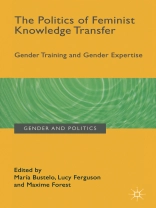The Politics of Feminist Knowledge Transfer draws together analytical work on gender training and gender expertise. Its chapters critically reflect on the politics of feminist knowledge transfer, understood as an inherently political, dynamic and contested process, the overall aim of which is to transform gendered power relations in pursuit of more equal societies, workplaces, and policies. At its core, the work explores the relationship between gender expertise, gender training, and broader processes of feminist transformation arising from knowledge transfer activities. Examining these in a reflective way, the book brings a primarily practice-based debate into the academic arena. With contributions from authors of diverse backgrounds, including academics, practitioners and representatives of gender training institutions, the editors combine a focus on gender expertise and gender training, with more theory-focused chapters.
Spis treści
Foreword; Myra Marx Ferree and Mieke Verloo
Preface
Acknowledgements
Notes on Contributors
Introduction; María Bustelo, Lucy Ferguson, and Maxime Forest
PART I: KEY ISSUES IN FEMINIST KNOWLEDGE TRANSFER
1. How to Wield Feminist Power; Elisabeth Prügl
2. Resistance in Gender Training and Mainstreaming Processes; Emanuela Lombardo and Lut Mergaert
3. Gender Expertise and the Private Sector: Navigating the Privatization of Gender Equality Funding; Lucy Ferguson and Daniela Moreno Alarcón
4.The Smothering of Feminist Knowledge: Gender Mainstreaming Articulated through Neoliberal Governmentalities; Tine Davids and Anouka van Eerdewijk
PART II: CRITICAL CASE STUDIES OF FEMINIST KNOWLEDGE TRANSFER
5. Windows of Opportunity, Trojan Horses and Waves of Women on the Move: De-colonizing the Circulation of Feminist Knowledges through Metaphors?; Rahel Kunz
6. Gender Training as a Tool for Transformative Gender Mainstreaming: Evidence from Sweden; Anne-Charlott Callerstig
7. Between Knowledge and Power: Triggering Structural Change for Gender Equality from Inside in Higher Education Institutions; Viviane Albenga
Conclusions; María Bustelo, Lucy Ferguson, and Maxime Forest
Appendix: Madrid Declaration on Advancing Gender+ Training in Theory and Practice
Index
O autorze
María Bustelo is Associate Professor of Political Science and Public Administration and director of the Master on Evaluation of Public Policies at Madrid’s Complutense University, Spain. An expert in the evaluation of gender equality policies, she has published extensively on Spanish gender policies and on the practice and evaluation of gender mainstreaming.
Dr Lucy Ferguson is a consultant for the UN Women Training Centre in Santo Domingo, the Dominican Republic. Her previous research on gender expertise has been published in the International Feminist Journal of Politics, and she was a member of the OPERA research team. As a practitioner, she works as a gender expert and trainer in her specialist field of tourism.
Dr Maxime Forest is Senior Researcher and Lecturer at Sciences Po Paris, France. He is currently scientific supervisor of the EU-funded EGERA project (Effective Gender Equality in Research and the Academia). Among his latest publications is The Europeanization of Gender Equality Policies. A Discursive-Sociological Approach, edited with Emanuela Lombardo (Palgrave, 2012).












